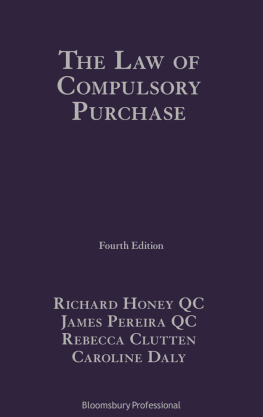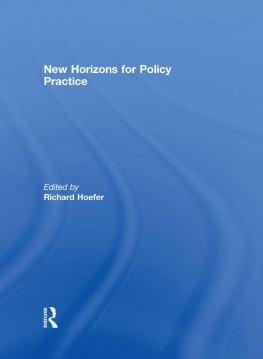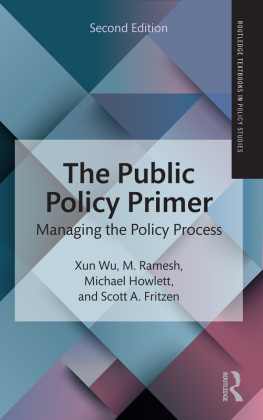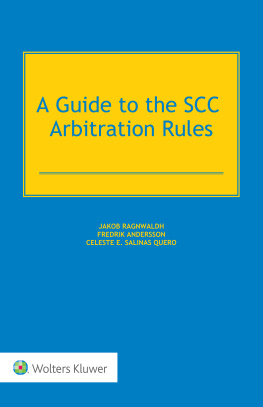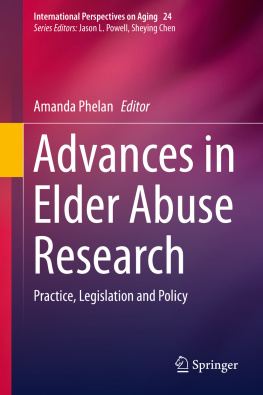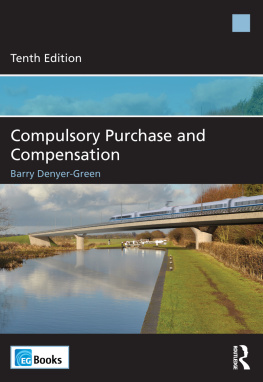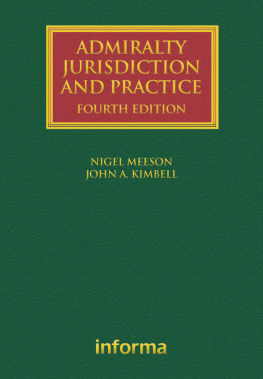Contents

The Law of Compulsory Purchase
The Law of Compulsory Purchase
4th Edition
General Editor
Richard Honey QC, BSc (Hons), MSc (Lond), FCIArb
Editors
James Pereira QC, MA (Cantab), LLM (Lond)
Rebecca Clutten MA (Cantab), Barrister
Caroline Daly MA (Oxon), LLM (Lond), Barrister
Consultant Editor
Guy R G Roots QC, MA (Oxon)

BLOOMSBURY PROFESSIONAL
Bloomsbury Publishing Plc
50 Bedford Square, London, WC1B 3DP, UK
1385 Broadway, New York, NY 10018, USA
29 Earlsfort Terrace, Dublin 2, Ireland
BLOOMSBURY and the Diana logo are trademarks of Bloomsbury Publishing Plc
First published in Great Britain 2022
Copyright Bloomsbury Professional, 2022
All rights reserved. No part of this publication may be reproduced or transmitted
in any form or by any means, electronic or mechanical, including photocopying,
recording, or any information storage or retrieval system, without prior
permission in writing from the publishers.
While every care has been taken to ensure the accuracy of this work, no responsibility
for loss or damage occasioned to any person acting or refraining from action as a
result of any statement in it can be accepted by the authors, editors or publishers.
All UK Government legislation and other public sector information used in the work
is Crown Copyright . All House of Lords and House of Commons information used in the
work is Parliamentary Copyright . This information is reused under the terms of the
Open Government Licence v3.0 (http://www.nationalarchives.gov.uk/doc/open
government-licence/version/3) except where otherwise stated.
All Eur-lex material used in the work is European Union,
http://eur-lex.europa.eu/, 1998-2022.
British Library Cataloguing-in-Publication Data
A catalogue record for this book is available from the British Library.
ISBN:PB:978 1 52651 883 5
ePDF:978 1 52651 885 9
ePub:978 1 52651 884 2
Typeset by Compuscript Ltd, Shannon
Printed and bound by CPI Group (UK) Ltd, Croydon, CR0 4YY
To find out more about our authors and books visit
www.bloomsburyprofessional.com. Here you will find extracts, author information,
details of forthcoming events and the option to sign up for our newsletters
This work was first published in 2000 as a loose-leaf textbook in two volumes. In the 21 years since then, it has also been published in book form now in this fourth edition and as an online service. One thing which has remained constant is that the law of compulsory purchase and compensation is to be found in a variety of statutes and statutory instruments and in numerous decisions of courts and tribunals. The need for a book to draw all this together in a clear and accessible way is as strong as ever.
Compulsory purchase will remain a vital feature in the activities of government. The use of powers to acquire land by compulsion is unsurprisingly the subject of policy debate in the context of housing, urban regeneration and infrastructure. The use of these powers is often controversial. The delivery of new infrastructure, and of schemes to promote the levelling-up of communities in some parts of the country, depends on the timely acquisition of the requisite land. Compulsory purchase powers are also likely to be relied upon in the efforts being made to tackle climate change. Such powers exist for renewable energy generation, flood and coast protection, and afforestation and tree-planting. All this will inevitably keep to the fore the long-standing tension between the rights of the citizen and the power of the state as it seeks to act in the wider public interest.
Progress has been made in recent years in reforming the law of compulsory purchase and compensation. Some reforms have yet to be introduced, such as the temporary possession powers in the Neighbourhood Planning Act 2017. The case for reform in this field remains as powerful as it ever was. Reform of the legislation is for Parliament, even though it is often through difficult cases that shortcomings in statutes become apparent. The role of the courts and of the Upper Tribunal (Lands Chamber) is of course a limited one: to interpret and apply the statutory scheme as it is, always avoiding being drawn into the realm of policy.
There has also been some movement in the approach taken to awards of compensation, some of which has been the subject of litigation. The Lands Chamber is now often dealing with appeals against certificates of appropriate alternative development. Its decisions in particular cases can be important in bringing clarity and predictability to parts of the non-statutory compensation code which are untested.
For much of the last two years, the Lands Chamber has had to contend with the pressures generated by the COVID-19 pandemic. It is to be commended for its resilience and for the way in which it has adapted, swiftly and effectively, to those pressures. It is as busy as ever, with compensation cases making up a large share of its work.
The new Practice Directions published in October 2020 have enabled some procedural innovations to be introduced. These Practice Directions encourage parties to follow the pre-reference protocol. They also provide opportunities for the use of alternative dispute resolution. An unreasonable refusal to follow the protocol or to engage in alternative dispute resolution may have costs consequences. There is an emphasis on co-operation between the parties, including the effective use of agreed statements. These changes will improve both access to justice and the efficient conduct of proceedings. They will help ensure that judges and members are able to devote their time and expertise to determining only those cases which truly call for resolution by a judicial decision.
This fourth edition covers all these developments in law and practice, and much more. The editorial team for this edition is new. Guy Roots QC stood down as General Editor when he retired from practice, and Richard Honey QC took over. Robert Fookes also stood down as an editor upon his retirement. Two authors have joined the team Rebecca Clutten and Caroline Daly, both experts in the field of compulsory purchase and compensation. James Pereira QC remains an editor. The book is in good hands for the future.
The Rt Hon Sir Keith Lindblom
Senior President of Tribunals
January 2022
I am delighted to welcome the third edition of this indispensable work. It is some 15 years since the Law Commission published its two Final Reports Towards a Compulsory Purchase Code: (1) Compensation (Law Com No 286) and Towards a Compulsory Purchase Code: (2) Procedure (Law Com No 291), a project which I had led during my time as Chairman of the Commission. The project had been approved by the then Lord Chancellor in response to the universal perception that the law of compulsory purchase and compensation was in urgent need of simplification and codification. The report described the current law as a patchwork of diverse rules, derived from a variety of statutes and cases over more than 100 years, which are neither readily accessible to those affected, nor readily capable of interpretation except by specialists. The intention, supported by government at the time, was that the Commission should prepare new legislation which would both set out standard procedures and contain a clearly defined compensation code. The report noted in particular the complexity of the problems raised by the so-called Pointe Gourde (or no-scheme) rule, and the unanimity of respondents to consultation on the need to clear the decks by replacing all existing formulations, statutory and judicial. Although the report contained a draft compensation code, it was not possible within the time and drafting resources available, to frame it in legislative form. The proposals received strong judicial support from the House of Lords (see

